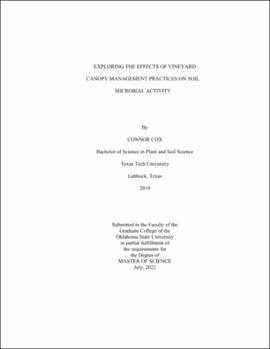| dc.contributor.advisor | Jilling, Andrea | |
| dc.contributor.author | Cox, Connor | |
| dc.date.accessioned | 2023-04-12T19:38:27Z | |
| dc.date.available | 2023-04-12T19:38:27Z | |
| dc.date.issued | 2022-07 | |
| dc.identifier.uri | https://hdl.handle.net/11244/337353 | |
| dc.description.abstract | The purpose of the study was to investigate soil fertility and microbial decomposition associated with vineyard canopy management practices which introduce plant litter into the soil. The study specifically focused on the mineralization and immobilization of carbon and nitrogen. In addition, the study also addressed how vineyard fungal disease management influences soil microbial activity. The use of fungicide to limit the presence of fungal disease in the canopy may suppress the vineyard soil’s microbial activity and thus may alter the release of nutrients from the plant litter back into the soil. In addition, soil microbial activity may be increased through residue management. | |
| dc.description.abstract | For the study, five plant residue types obtained from a Vitis vinifera hybrid 'Chambourcin' from the Cimarron Valley Research Station in Perkins, Oklahoma, were added to vineyard soil. The plant litter treatments consisted of grapevine pruning (i.e., woody plant material from the dormant period of the grapevine), grapevine leaves and shoots, fruit, and aboveground tissues from two cover crops, wheat, and clover. Additionally, half of the incubation treatments received Mancozeb, a commonly used fungicide in vineyards, to examine the potential effect of viticultural disease management practices on soil microbial populations. Wheat, the highest quality litter in terms of carbon to nitrogen ratio, had the highest amounts of ammonium and nitrate, microbial biomass carbon and cumulative CO2 respiration. Fungicide additions suppressed microbial activity and initially prevented the conversion of nitrate to ammonium. Targeted canopy management in vineyard systems may thus improve soil fertility and provide pathways to more sustainable fertilizer use. | |
| dc.format | application/pdf | |
| dc.language | en_US | |
| dc.rights | Copyright is held by the author who has granted the Oklahoma State University Library the non-exclusive right to share this material in its institutional repository. Contact Digital Library Services at lib-dls@okstate.edu or 405-744-9161 for the permission policy on the use, reproduction or distribution of this material. | |
| dc.title | Exploring the effects of vineyard canopy management practices on soil microbial activity | |
| dc.contributor.committeeMember | Cartmell, Dwayne | |
| dc.contributor.committeeMember | Rich, Karl | |
| osu.filename | cox_okstate_0664m_17850.pdf | |
| osu.accesstype | Open Access | |
| dc.type.genre | Thesis | |
| dc.type.material | Text | |
| thesis.degree.discipline | International Agriculture | |
| thesis.degree.grantor | Oklahoma State University | |
